Lilacs… A Poem by Amy Lowell
Thomas Oboe Lee (b. 1945)
Shari Feldman, soprano
Guzal Isametdinova, piano
The Stream Flows
Bright Sheng (b. 1955)
William Gu, viola
Naica
Viet Cuong (b. 1990)
Willie Hadnot, Jr., alto saxophone
Clarinet Sonata
Paul Chihara (b. 1938)
Kyle Glasgow, clarinet
Guzal Isametdinova, piano
Jhula Jhule
Reena Esmail (b. 1983)
Amir Hossein Norouz Nasseri, violin
Guzal Isametdinova, piano
Lilacs… A Poem by Amy Lowell
THOMAS OBOE LEE
Born September 5, 1945, Beijing
Born in Beijing, Thomas Oboe Lee moved to Hong Kong and Brazil before moving to the United States in 1966. He studied composition at the University of Pittsburgh, the New England Conservatory and Harvard University. He has been on the faculty of Boston College since 1990. Lee was awarded twice the Guggenheim Fellowship, the Charles Ives Fellowship and two National Endowment for the Arts Fellowships, among his many other awards. He is among the few Asian composers who have been commissioned by the Library of Congress.
Amy Lowell is an American poet born in 1874 and a Pulitzer prize winner. Lilacs is one of her personal favorite poems.
Lilacs:
Part 1. Moderato.
Lilacs,
False blue,
White,
Purple,
Color of lilac,
Your great puffs of flowers
Are everywhere in this my New England.
Among your heart-shaped leaves
Orange orioles hop like music-box birds and sing
Their little weak soft songs;
In the crooks of your branches
The bright eyes of song sparrows sitting on spotted eggs
Peer restlessly through the light and shadow
Of all Springs.
Lilacs in dooryards
Holding quiet conversations with an early moon;
Lilacs watching a deserted house
Settling sideways into the grass of an old road …
Part 2. Recitativo and Allegro.
You are everywhere.
You were everywhere.
You tapped the window when the preacher preached his sermon,
And ran along the road beside the boy going to school.
You stood by the pasture-bars to give the cows good milking,
You persuaded the housewife that her dishpan was of silver,
And her husband an image of pure gold.
You flaunted the fragrance of your blossoms
Through the wide doors of Custom Houses—
You, [and] sandal-wood, and tea,
Charging the noses of quill-driving clerks
When a ship was in from China ...
You are of the green sea,
And of the stone hills which reach a long distance.
You are of elm-shaded streets with little shops where they sell kites and marbles,
You are of great parks where every one walks and nobody is at home.
You cover the blind sides of greenhouses
And lean over the top to say a hurry-word through the glass
To your friends, the grapes, inside.
Part 3. Moderato.
Lilacs,
False blue,
White,
Purple,
Color of lilac,
You have forgotten your Eastern origin,
The veiled women with eyes like panthers,
The swollen, aggressive turbans of jeweled pashas.
Now you are a very decent flower,
A reticent flower,
A curiously clear-cut, candid flower,
Standing beside clean doorways,
Friendly to a house-cat and a pair of spectacles,
Making poetry out of a bit of moonlight
And a hundred or two sharp blossoms.
Part 4. Recitativo and Allegro.
Maine knows you,
Has for years and years;
New Hampshire knows you,
And Massachusetts
And Vermont.
Cape Cod starts you along the beaches to Rhode Island;
Connecticut takes you from a river to the sea …
May is lilac here in New England,
May is a thrush singing “Sun up!” on a tip-top ash tree,
May is white clouds behind pine-trees
Puffed out and marching upon a blue sky.
May is a green as no other,
May is much sun through small leaves,
May is soft earth,
And apple-blossoms,
And windows open to a South Wind.
May is full light wind of lilac
From Canada to Narragansett Bay.
Part 5. Moderato.
Lilacs,
False blue,
White,
Purple,
Color of lilac.
Heart-leaves of lilac all over New England,
Roots of lilac under all the soil of New England,
Lilac in me because I am New England,
Because my roots are in it,
Because my leaves are of it,
Because my flowers are for it,
Because it is my country
And I speak to it of itself
And sing of it with my own voice
Since certainly it is mine.
The Stream Flows
BRIGHT SHENG
Born December 6, 1955, Shanghai
One of the leading composers of our time, Bright Sheng’s music has been commissioned and performed by many of the most prestigious institutions in the world. He was born in Shanghai and started studying piano at a young age. During the Cultural Revolution, he was sent to Qinghai where he played piano and percussion for the local theater. After the Cultural Revolution, he was one of the class of students to be admitted into the Shanghai conservatory. In 1982, he moved to New York City where he studied at CUNY Queens College and later at Columbia University. He is currently a professor of composition at the University of Michigan.
The composer writes:
The Stream Flows, which is dedicated to my teacher Hugo Weisgall, is in two parts. The first part is based on a famous folk song from the southern part of China. The freshness and richness of the tune deeply touched me when I first heard it. Since then I have used it as basic material in several of my works. Here I hope that the tone quality of a female folk singer is evoked by the timbre of the solo violin. The second part is a fast country dance based on a three-note motive.
The Stream Flows
The rising moon shines brightly,
It reminds me of my love in the mountains.
Like the moon, you walk in the sky,
as the crystal stream flows down the mountain.
A clear breeze blows up the hill.
My love, do you hear I am calling you?
Naica - for alto saxophone and live delay processing
VIET CUONG
Born September 8, 1990, Los Angeles, California
Viet Cuong has been commissioned by the New York Philharmonic, the Atlanta Symphony Orchestra and the Saint Paul Chamber Orchestra, among many others. His music has been featured in venues such as the Carnegie Hall and the Kennedy Center. He was recently featured in The Washington Post’s “21 for ’21: Composers and performers who sound like tomorrow.” He is passionate about composing pieces with peculiar instrumentations and melodies, as you will hear in Naica, where there is a live delay processing program playing with the alto saxophone.
The composer writes:
The crystal caves of Naica provided amazing visual inspiration for my first venture into composing music with live interactive electronics. A simple gate-in and gate-out object in Max MSP creates a delay that initiates an unchanging tempo for the duration of the piece. Therefore, harmonies must shift using common tones and are always built upon the notes preceding them.
Clarinet Sonata
PAUL CHIHARA
Born July 9, 1938, Seattle, Washington
Paul Chihara was born in Seattle in 1938. He spent three years of his childhood in an internment camp in Idaho, where he had his first public musical performance. He studied composition with Nadia Boulanger, Robert Palmer and Ernst Pepping. He was the first composer-in-residence of the Los Angeles Chamber Orchestra, and also was in residence with the San Francisco Ballet. Chihara has been commissioned by the Guggenheim foundation and the National Endowment of the Arts as well as the Cleveland, LA, London and Boston symphonies. He draws influences from Asian music and also jazz. A prolific composer, he has composed over 100 film scores in addition to his symphonies and chamber and solo pieces.
The clarinet sonata is based on Chihara’s memory of a violin sonata.
Jhula Jhule
REENA ESMAIL
Born February 11, 1983, Chicago, IL
Renna Esmail is an Indian American composer who works between the worlds of Indian and Western Classical music. She has been commissioned by the Kronos Quartet, Imani Winds, the Richmond Symphony, the Albany Symphony and Coretet. Upcoming commissions and premieres include the Seattle Symphony, the Baltimore Symphony Orchestra and Santa Fe Pro Musica and Desert Chorale, among others. She is a 2019 United States Artist Fellow in Music and a 2020–21 composer-in-residence for the Seattle Symphony. She has received the Fullbright-Nehru fellowship to study Hindustani music in India and was also a Kennedy Center Citizen Artist fellow. Esmail’s music draws upon her heritage and provides “stunning originality” (Boston Classical Review) to her audiences.
The composer writes:
When writing this piece, to be based upon Indian folksong, I cast a wide net for source material—I scoured the internet and my large collection of Indian music, listening to everything from Bengali Bauls, Rajasthani folk singing. I even tried to find songs from Goa and Gujarat, the places my parents are from in India, typing every conceivable search term into Google. However, the material I felt most connected to in the end didn’t come to me from a distant corner of India, but in the most common way folk music can be transmitted: through the generations of my own family.
This piece uses two folk melodies. The first is a song called “Ankhon vina andharon re,” which I found on a recording my mother’s father made long before I was born. Of his five grandchildren, I am the only one who never met him. But as I’ve grown up, I realize how much we have in common, including our deep love of music. My mother often tells me stories of listening to records of Beethoven Symphonies on hot nights in Kenya, where my grandfather spent most of his life. All the lights were turned off, and they would listen as a family, in the silent darkness, following his lead as he taught them to savor each note. We still have recordings of my grandfather singing songs in many languages—English, Marathi, Konkani, Portuguese and others—which I listen to from time to time, imagining what it might have been like to know him.
The other song comes to me from my grandmother, my father’s mother. My father’s parents (who even our American friends affectionately called Mamma and Pappa) moved to the US the year before I was born, and lived with us for most of my childhood. I grew up speaking to Mamma only in Gujarati, a language that I spoke to no one else until she died in 2007. As a baby, Mamma would often sing me this lullaby: Jhula Jhule, Jhula Jhule / Reena Rani Jhula Jhule which translates: Back and forth, back and forth / Reena the Queen swings back and forth. It has been years since I have thought about this melody, but while working on this project, it suddenly popped back into my mind. I’m so glad it did—it is one of the few musical memories I have of her.
Working on this piece was very special for me. I spent most of my childhood as a first-generation American unconsciously trying to separate my home life from my outside life. I became aware very early on that there was no real resonance for my Indian culture in my American surroundings. As a composer, I’ve often quoted from pieces I love (mostly by other western composers, and more recently from Hindustani bandishes). But this is the first time I’ve felt able to bring songs from my own family into my music, and into the western concert hall. I think—I hope—I’ve finally found a point of resonance.
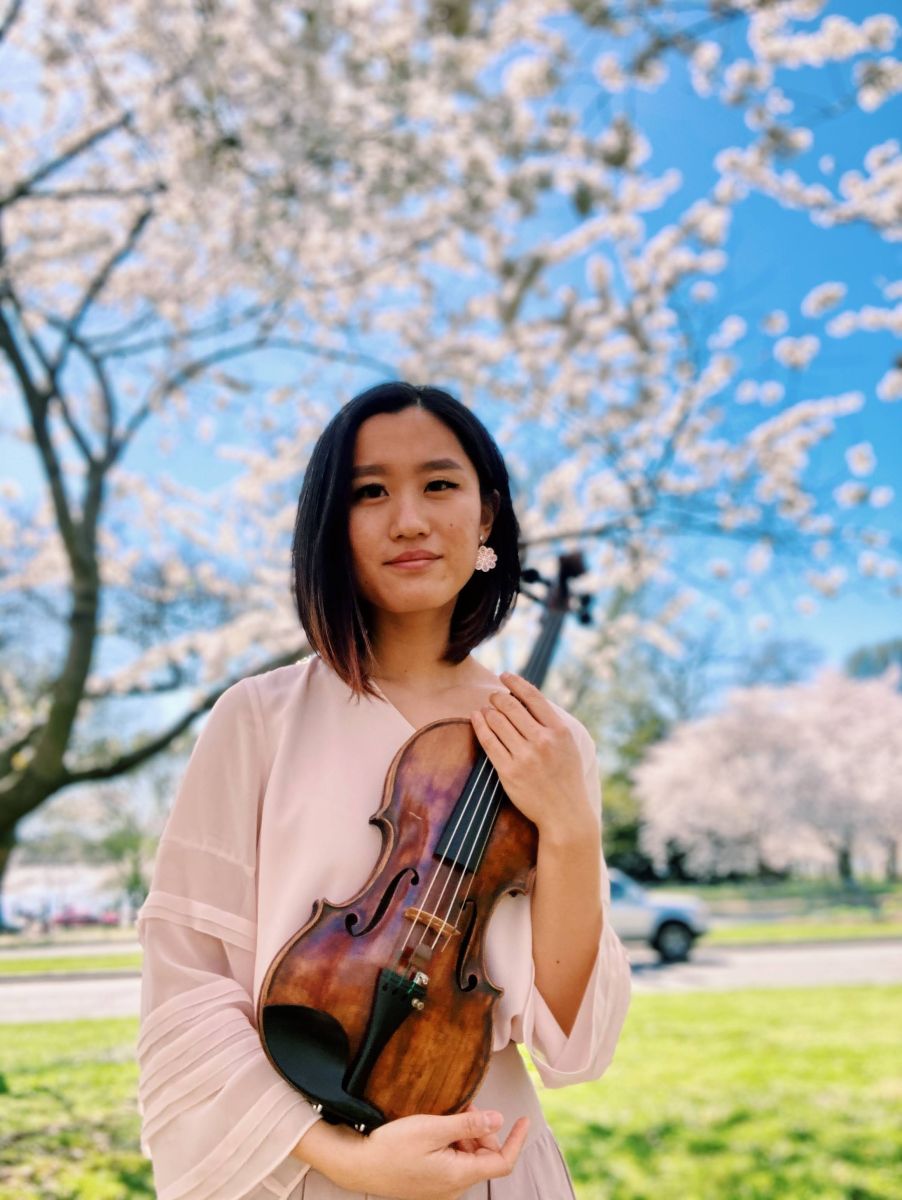 TONG LI
TONG LIConcert curator Tong Li, violinist, is the current chamber music graduate assistant at the University of Maryland School of Music studying with James Stern, where she was a finalist of the UMSO concerto competition and the recipient of the M-cubator grant award. She did her undergraduate studies at the Eastman School of Music with Renee Jolles and was a graduate of the Cleveland Institute of Music Preparatory Division. She frequently played with Symphoria and was an associate member of the Chicago Civic Orchestra for its 2020–21 season. She has participated in festivals such as Interlochen, Brevard, AIMs in Graz, the Maine Chamber Music Seminar and the Detroit Symphony Orchestra institute. Li has soloed with the Lakeland Civic Orchestra and also the St. Petersburg Music Academy Chamber Orchestra, and has served principal positions in the University of Maryland Symphony Orchestra, Brevard Music Center Orchestra and Eastman Philharmonia, among others. She has performed in masterclasses for Gary Levinson, Audrey Wright, Frank Huang, Giora Schmidt, Melissa White, Ani Kavafian and Peter Zazofsky. Li enjoys an active teaching and performance schedule in the DMV area.
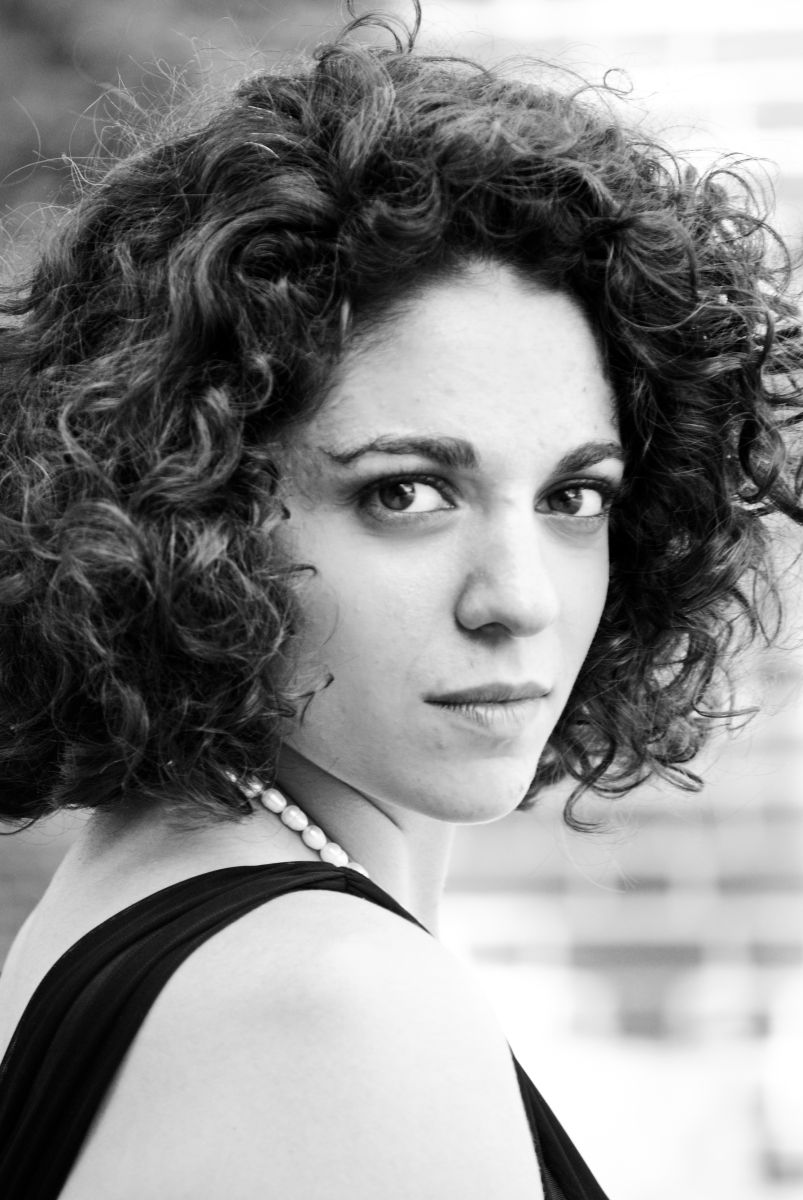 SHARI EVE FELDMAN
SHARI EVE FELDMAN
Shari Eve Feldman, soprano, is a doctor of musical arts candidate in voice performance at the University of Maryland School of Music, where she studies with mezzo-soprano Delores Ziegler. In addition to her studies, she teaches private lessons for the School of Music and is a graduate assistant for the Honors College, where she supports the Honors Humanities Living Learning Program and curriculum. Feldman is passionate about all things musical, including chamber music collaboration, avant garde performance practice, and the intersection of ‘sister arts’ poetry and music within contemporary classical song literature. She has sung in projects ranging from large choral, orchestral and operatic works to solo recital engagements with the Baltimore Concert Opera, Opera Delaware, Choir School of Delaware, the Jerusalem Symphony Orchestra, Washington Piano Society, New Music Delaware Festival, The Arts Club of Washington, TEMPO New Music Ensemble, StageFree, the Baltimore Symphony Orchestra and the National Symphony Orchestra. Feldman is currently working on a dissertation that explores the life cycle of the art song from the 19th to 21st centuries, first through the eyes of American poets Amy Lowell and Emily Dickinson and reimagined through 20th century composers.
A proud “Blue Hen,” Feldman holds both a bachelor of arts in music and a master of music from the University of Delaware, as well as a graduate certificate in nonprofit management from the University of Maryland School of Public Policy and Do Good Institute. She maintains a private studio of voice students and teaches song literature, opera history and style analysis classes through Prince George’s Community College. She also cantors for the Riderwood Jewish Community in Silver Spring, MD.
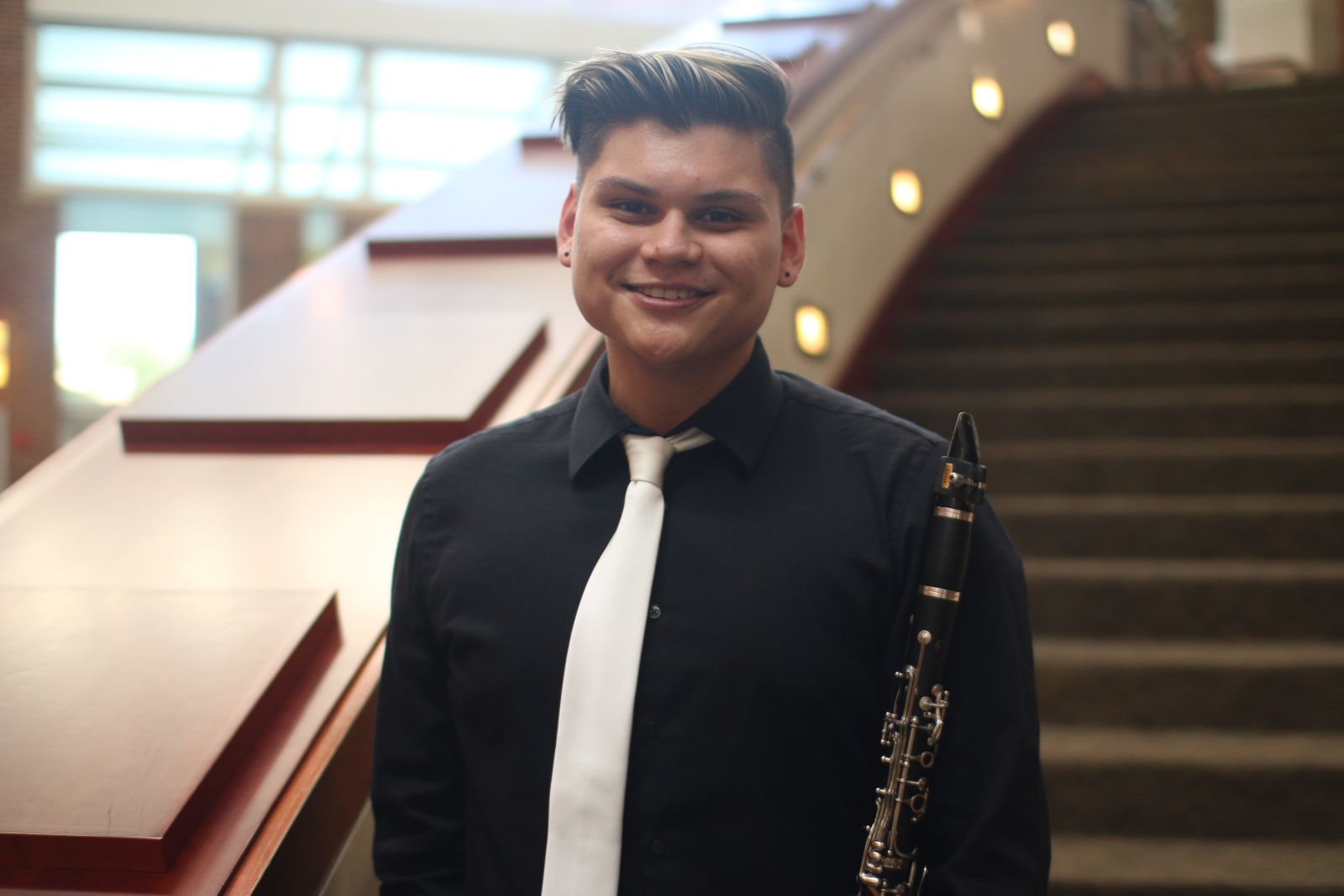 KYLE GLASGOW
KYLE GLASGOWKyle Glasgow is studying at the University of Maryland, College Park for a master's degree in clarinet performance, having just earned his bachelor's from the same institution. Along with serving as the clarinetist of Ignis Fellowship Quintet, Glasgow aims to continue premiering new music with the goal of amplifying the voices of underrepresented composers in the western classical music world. He has a particular interest in modern recording and audio engineering and production. Through collaborative efforts in community engagement and outreach, recording and utilizing modern technology in tandem with traditional performance principles, Glasgow aims to push both the boundaries of chamber music and classical clarinet beyond the standard classical canon. He has a multifaceted musical skill set with additional skills in clarinet repair, reed making, conducting and aural skills. Specializing in the E-flat clarinet, he is an experienced auxiliary clarinetist and can be heard on several reference recordings for the Naxos musical database. Glasgow has performed in clinics and masterclasses around the world including the Princess of Asturias program in Spain, ClarinetFest in Ostend, Belgium and the Interlochen Center for the Arts. He teaches a private studio of clarinetists of all ages in the DMV area, and he serves as the co-conductor of the New Horizons Clarinet Choir and as a clarinetist for the Polka Terps. He continues to study with Robert DiLutis at the University of Maryland as well as with several other clarinetists in the region.
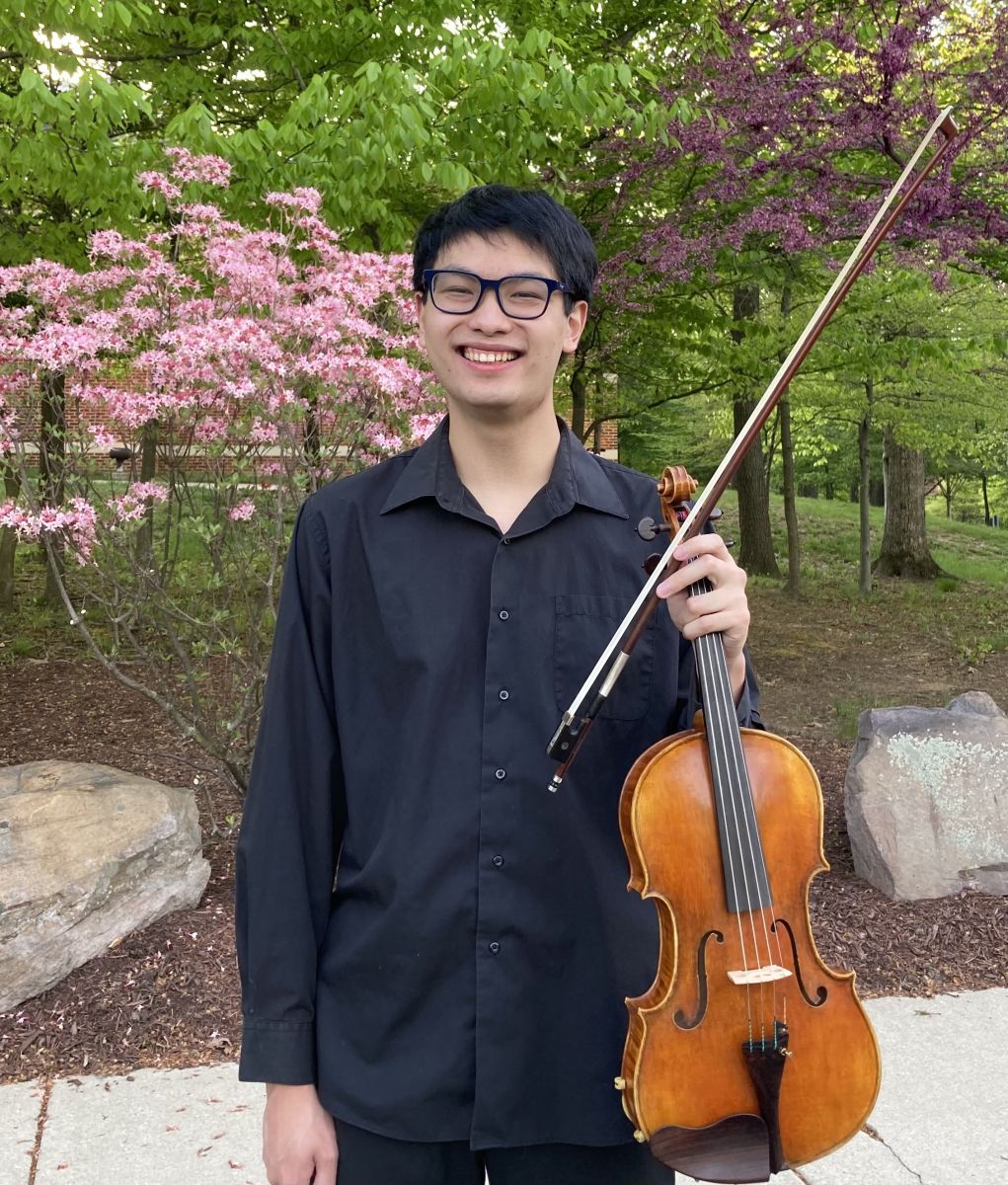 WILLIAM GU
WILLIAM GU William Gu is a Chinese American musician from Rockville, Maryland. He is currently pursuing an undergraduate degree in viola performance at the University of Maryland, College Park under the tutelage of Katherine Murdock. He has attended summer chamber music festivals such as Green Mountain Chamber Music Festival and DaPonte String Quartet Institute. Gu is a passionate advocate of new music and has had the honor of collaborating with several living composers. He has performed many of these new works at events such as the District New Music Coalition Conference at Catholic University and TEMPO concerts at the University of Maryland. Recently, his original composition Daydream was premiered at the UMD-hosted event “Living Music” featuring the Pressez Quartet. In 2021, he was a finalist in the University of Maryland Concerto Competition, where he performed Bartok’s Viola Concerto. Gu has participated in masterclasses from distinguished performers and teachers such as Claudine Bigelow, Victoria Chiang, Roberto Diaz and Rita Porfiris. Engaging with the community is an important part of Gu’s artistic mission. He finds performing in retirement communities such as The Village at Rockville, Brightview Senior Living and Collington Retirement Home extremely rewarding. Gu values connecting with audiences and is grateful for the privilege of making music with friends he loves.
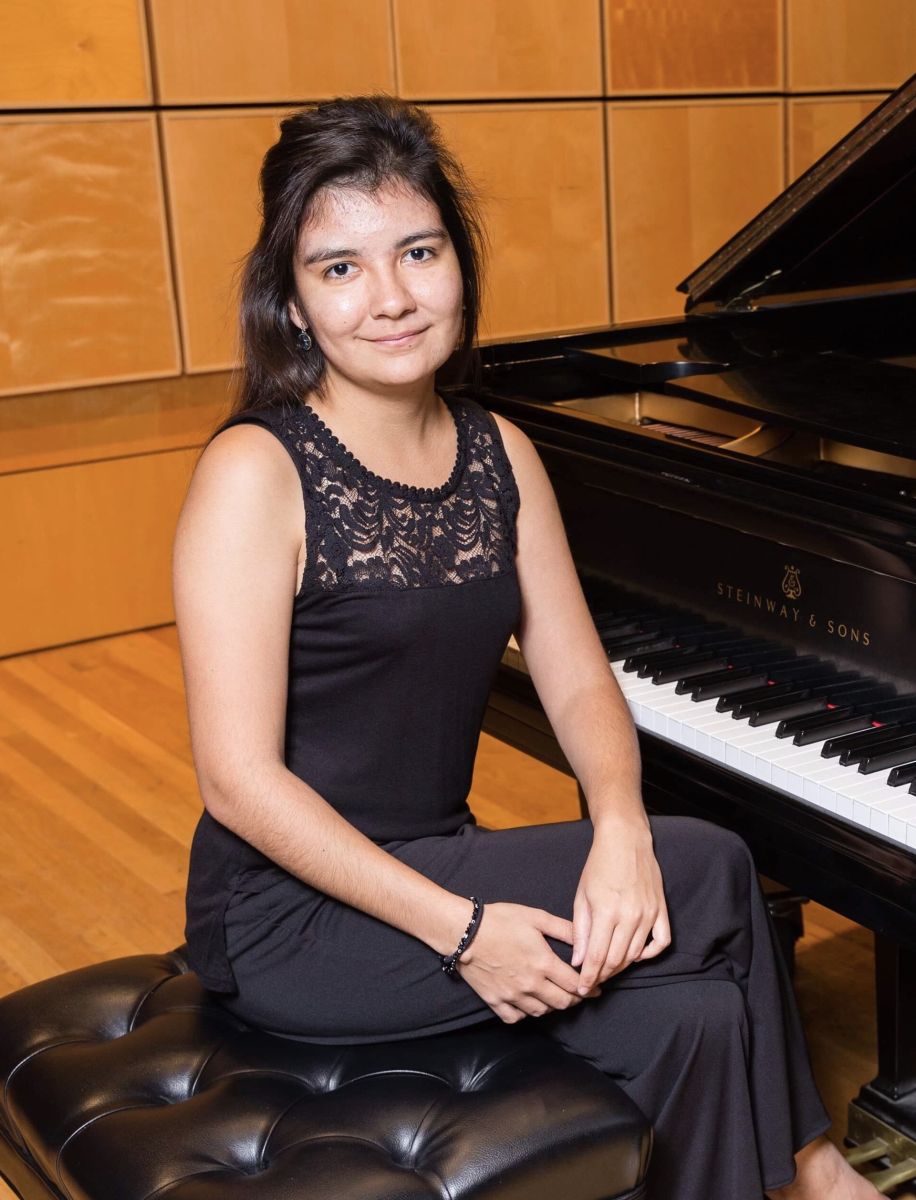 GUZAL ISAMETDINOVA
GUZAL ISAMETDINOVAUzbekistani pianist Guzal Isametdinova has cultivated her passion for music from a very early age. As a soloist, she appeared with a Chamber Orchestra of Uzbekistan, performing Mozart’s D minor concerto. As a chamber partner, Isametdinova won twice the John Oliveira String Competition as well as the Lyric Chamber Competition in 2018 in Florida with her group Trio Fantasia, which led to their New York recital debut. Additionally, she is a prize recipient of competitions held in the United States, Europe, Russia and Uzbekistan both as a soloist and a chamber musician.
Isametdinova’s experience as a pianist ranges from baroque repertoire to contemporary music, and she always tries to diversify her job as an artist by also specializing in organ and harpsichord playing. Isametdinova is currently pursuing a doctoral degree at the University of Maryland, College Park under the guidance of the renowned Rita Sloan.
.JPG) WILLIE BERNARD HADNOT, JR.
WILLIE BERNARD HADNOT, JR.Willie Bernard Hadnot, Jr., was born and raised in Athens, TX. Hadnot’s musical journey started in church, singing in various choirs and learning piano to accompany the choir. Saxophone became Hadnot’s primary focus in middle and high school. Hadnot attended Trinity Valley Community College in Athens, TX, and was heavily involved in the music program. After receiving his associate in arts in music in 2015, Hadnot attended The University of Texas at Tyler, TX, where he studied saxophone under Sarah Roberts. Hadnot completed his bachelor of music in the spring of 2018.
Hadnot is currently pursuing a masters of music in saxophone performance at UMD under the instruction of Tim Powell. Hadnot was a recent finalist in the 2021 UMD Symphony Orchestra Concerto Competition and is a member of the UMD Wind Orchestra and the UMD Jazz Ensemble. Hadnot lives in Annapolis, MD, where he serves as a minister of music for Heritage Baptist Church. He is currently the interim middle school band and orchestra director for Annapolis Middle School.
AMIR NOROUZ NASSERI
Amir Norouz Nasseri is an Iranian violinist and composer. He is a graduate of the University of Tehran, where he earned a bachelor of music in violin performance. His performance activities range from chamber music and solo concerts to performing with early music and historically-informed ensembles. Nasseri was a member of the early music ensemble “Tehran Baroque Music Atelier,” the only early music ensemble working in the country at the time. He has also been awarded the first prize at the Javan Music Festival and competition in Iran. He has composed soundtracks for several short independent movies and has been awarded two prizes for the best movie soundtrack at Nahal Film Festival in Tehran.
Nasseri is currently pursuing a master’s degree in violin performance at the University of Maryland, College Park under David Salness.
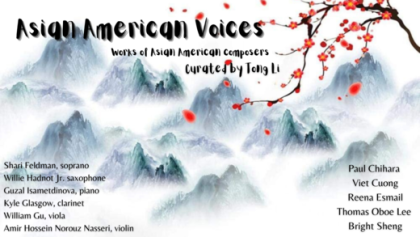
 TONG LI
TONG LI SHARI EVE FELDMAN
SHARI EVE FELDMAN KYLE GLASGOW
KYLE GLASGOW WILLIAM GU
WILLIAM GU  GUZAL ISAMETDINOVA
GUZAL ISAMETDINOVA.JPG) WILLIE BERNARD HADNOT, JR.
WILLIE BERNARD HADNOT, JR..jpg)
